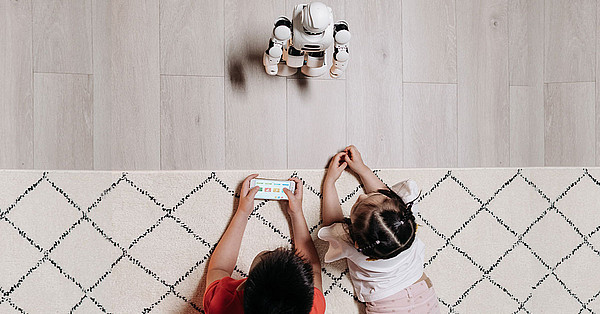AI in social mediaWhat should parents know about artificial intelligence?

Platforms like TikTok, Instagram, and Snapchat use artificial intelligence (AI) primarily to influence the user experience. They recommend content, try to filter out inappropriate content, and flush targeted ads into users' feeds. Posted images or videos are analyzed to suggest suitable effects, filters or subtitles. Such mechanisms run in the background and are not necessarily associated with AI. These functions are so-called "weak AI" developed to solve specific problems. For example, to select personalized advertising.
Numerous new functions are currently being explicitly advertised with reference to AI. These include image generators, chatbots, or AI-created people who can be used as influencers, for example.
- An image generator is integrated into TikTok, for example. With the help of artificial intelligence, it generates images from textual image descriptions that users can then use as backgrounds.
- Snapbot supports Snapchat Plus subscribers. It is intended to simulate communication similar to that with friends. For example, you can ask it questions, ask it to create a new Snap or search for content in the app.
- AI-generated representations of a person are already being used by some companies on Instagram, for example. This allows large corporations to appear more tangible and not "rely" on a real person. In addition, the computer-generated person can be created completely at will. However, the content of these AI influencers is still made by humans, for example by advertising agencies. Only their appearance is created by computer, as in a video game, for example.
Dangers of AI in social media
Such new features can pose some risks, especially for children and young people. These include cyberbullying, invasion of privacy, disinformation and deepfakes.
- Among other things,cyberbullying often happens because the perpetrators feel anoym on the net. This feeling can be intensified by AI, since one can, for example, appear with computer-generated persons. In addition, large-scale "attacks" can be launched automatically with artificial intelligence and the reach amplified.
- Privacy is not a big issue with AI-powered products and services. They often collect large amounts of personal data and make it difficult for users* to control what happens to their data.
- AI image generators make it easier to create content that is not true. In this way, targeted disinformation and deepfakes can be spread.
What can parents do?
- Find out about the topic of artificial intelligence. In order to accompany children in the media world, it helps if parents inform themselves about new developments at an early stage. The Federal Ministry for Family Affairs, Senior Citizens, Women and Youth offers the "Digital Debates Guide" for this purpose.
- Educate your children about data privacy. Only the most necessary data should be disclosed to services. Help children and young people in particular to understand the privacy policy of the services. You can find information on this in our brochure "Data protection tips for parents".
- Fake news and deep fakes could increase rapidly due to the new possibilities of AI systems. Critical checking of content on the Internet is therefore becoming increasingly important. You can find more information on this in the Fake News topic area or in the parents' brochure "Will you go fact checking with me?" and the accompanying checklist.
